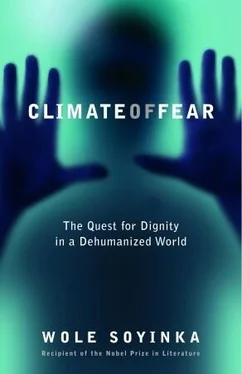And now we come to the nurturing environment of the mantra. As I began my lecture tour of some European universities during that exile, it did not take long for me to realize that the mood of the historic Paris uprising was still in the ascendant, never mind the failure of that movement — and perhaps the zeal, being all that was left, was even more willfully embraced on that account. I came into daily contact with students and all manner of disenchanted youths seeking a revolutionary answer to the inequalities, the oppressive contradictions of their societies. Maoists, or Maoist-Leninists, or Trotskyites,
Proudhonists, or Maoist-Leninist-Trotskyites, Stalinist-Leninists… no matter what hyphenated revolutionary tendencies they professed, all had one fundamental trait in common. They were bearers of a new illumination on the condition and future of human society.They were the subversive agents who would topple the bourgeois order and liberate the “new man” with all his potential, unfettered by the norms of a failed society, its hypocrisies and dubious ethical values. They formed a compact of solidarity with the marginalized no matter how remotely placed — from the bauxite mines of Jamaica to the coal mines of South Africa. Ideologically schooled in Marxism, even at its most rudimentary, most did not directly espouse anarchism as a social philosophy, but gave a practical, anarchic demonstration of the cue they had elicited from Karl Marx’s analysis of law: law was not neutral, but was an instrument to protect the interests of the ruling classes. In a class struggle, therefore, which it was their avowed mission, indeed their duty, to initiate, law itself was to be repudiated.
As for wealth, from where did wealth emanate but from the exploitation of man by man, proven by the immoral profit from the surplus labor of others? Thus, logically, their enabling mantra, based on the authority of Karl Marx, which declared quite simplistically that All property is theft. That slogan was put into practice in any number of ways, from the merely self-dramatizing gesture to the socially disruptive, once it was placed in tandem with Marx’s interpretation of law, which could now be taken as advocating its own overthrow.
In Germany or France of the late sixties to early seventies, a student who took a parked bicycle, motorbike, or motorcar that belonged to another did not consider it an act of theft. He kept it and returned it at his leisure, or simply kept it for as long as it took him to acquire a more attractive or convenient one, abandoning the former hundreds of kilometers from where its owner last saw it. Libraries bewailed their helplessness as students took away books and never returned them, often returning to exercise their right to “borrow” some more. Others felt that the shelves of bookstores should be open to the acquisitive mood of the reader. Students felt quite noble in raiding the accounts of a parent or guardian — or indeed, the neighborhood store. All property is theft —and that, do take note, included intellectual property. In short, plagiarism was no crime.
I recall an incident in my own university in Ibadan, Nigeria, where a radicalized section of the student body had also caught the fever. If my former students are listening, I hope they will excuse me — I promise that this is the last time I shall make use of this incident, but it was a most revealing episode for me at the time, given my own search for an ideological anchor within the troubled and questing postcolonial generation in my own society. In any case, it is simply too juicy a recollection for me to abandon so easily! There was a protest demonstration; I no longer recall the cause, but it grew violent. In the process, a professor whose role was considered objectionable during the crisis became a target of the students’ ire and a prime candidate for “revolutionary justice”— another of those rhetorical devices embraced by states in their postrevolution phase and adopted by radical movements.The professor’s house on campus was invaded and vandalized, then his office. His research papers were set on fire. Later, I tackled some of the students: why, I demanded, had they gone so far as to destroy what was, in effect, the lifework of this senior colleague (whose politics, incidentally, I also despised)? The reply I received was straight from the European revolutionary cookbook that I had encountered in Paris or Frankfurt: intellectual property, they declared, is not the product of any one individual; thus, the professor had no personal claims to anything that was lost.
That same tendency — albeit by no means of the same pyromaniacal temper — was echoed at the time by radical caucuses in Europe and the United States. It gave rise to the buzzword “collective.” Even performance groups were no longer acting companies or drama troupes, but “collectives.” A famous American author caught the fever. She went — for a while — to the extreme extent of refusing to credit her own person with authorship of her books: it was the work of collective humanity, she declared, and she was merely the humble medium through whom these insights were expressed. It was one of those revivalist periods of the thoughtful, committed, but guilt-laden left — personal proprietorship of any kind had become the original sin. I recall meeting her during this period and asking her how she resolved the issue of collectivism when it came to the distribution of royalties. Frankly, I do not remember that she provided any satisfactory answer.
This was an infectious, but only mildly misleading eruption of the rhetorical hysteria that overtook radicalized minds all over the world, one that was characterized by a one-dimensional approach to all faces of reality, however varied or internally contradicting. The most dangerous of these catchphrases has surely resurfaced in the minds of many of us in contemporary times: There are no innocents! Yes, it was prevalent even then. The sixties and seventies’ mood of extreme militancy, its repudiation of all “bourgeois morality,” a natural proceeding from the logic of the class-subservient interests of law, led remorselessly to the tacit, sometimes loudly argued endorsement of acts of sabotage, kidnapping, and even murder. At the time, the self-willed hysteria was induced by a deliberate exercise of blinding the mind to other considerations, screaming doubts into silence. Sometimes it was a silent scream, inaudible, but it was one that was nonetheless legible on the faces of a number in any crowd of those “conscientization” sessions if one was not caught up in the rhetorical fervor. The sessions were closer in temper to a Billy Graham religious revivalism than to the models that they sought to emulate, such as Fidel Castro’s famous marathons.
Shall we take one more example? It would be a great pity to leave out a revolutionary favorite of that infectious season of liberation, whose total, self-sacrificial idealism was certainly shared by many of us in that generation, indeed, must be regarded as inevitable, given the circumstances of colonial repressions: Power grows from the barrel of a gun —attributed to Mao Zedong. It filled the revolutionary airwaves, but, even if this were a truthful absolute — and I use this only as an illustration of the elisions that are built into the rhetorical structure — what was conveniently suppressed were the innumerable contradictions and cautions of the dialectical propositions that would arise effortlessly from such a thesis, and which strike us today, in hindsight, with such demonstrable force from one continent to another. I refer to potentially inhibitory discoveries of history and society, such as Power corrupts, and absolute power corrupts absolutely. Nowhere was this more robustly exemplified than in the Soviet Union and its empire, which were held up as fulfillment of radical absolutes that sometimes proved little more than rhetorical devices. There is room for dialectical thought within rhetoric — indeed, rhetoric may be reinforced by legitimate syllogisms — but the heady rhetoric whose goal is mass hysteria is not designed to pause for sequences of logical, even if purely theoretical, deductions.
Читать дальше












